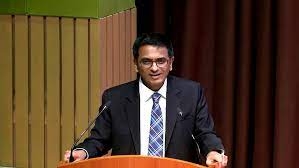He reproves HC Boss Judges for closing down web-based trials post-pandemic

The Chief Justice of India, D.Y. Chandrachud, has emphasized the importance of virtual court technology, stating that it is here to stay “now and forever”. He has criticized certain High Court Chief Justices who have shut down online court hearings post-pandemic, and have disregarded the technological infrastructure that was created using public money. The Chief Justice believes that it is the duty of these Chief Justices to embrace virtual court technology and come on board. He has expressed his concern and disappointment with the attitude of these individuals and stressed that they cannot just switch off cameras and microphones and insist on the physical presence of lawyers and litigants.
Chief Judges compelled by a sense of honor to spend public assets
During a discussion on the importance of virtual court technology, S Prabhakaran, Vice President of the Bar Council of India, expressed concern over the difficulty of technological access in rural areas. In response, Chief Justice of India, D.Y. Chandrachud, acknowledged the issue and stated that Prabhakaran was right to raise it. The Chief Justice emphasized the need to address the technological divide and ensure that all individuals, regardless of their geographic location, have access to virtual court proceedings. The conversation reflected a constructive dialogue about the challenges of implementing virtual court technology in a way that is inclusive and equitable for all.
During a discussion on the importance of virtual court technology, Chief Justice of India, D.Y. Chandrachud, acknowledged the challenges of implementing such technology in rural areas. He stressed the need to reach out to ensure that all individuals have access to virtual court proceedings, regardless of their geographic location. The Chief Justice expressed concern that the availability of virtual court technology should not depend on the willingness of a particular Chief Justice of a High Court to adopt it. The conversation reflected a commitment to finding solutions that are inclusive and equitable for all, and which prioritize the needs of those who may face barriers to accessing virtual court proceedings.
A few Councils likewise disbanding innovation
During a recent discussion on virtual court technology, Chief Justice of India, D.Y. Chandrachud, expressed the importance of ensuring that all individuals have access to virtual court proceedings, regardless of their location. The Chief Justice acknowledged the challenges of implementing such technology in rural areas, but stressed the need to reach out and find solutions to bridge the technological divide. He also expressed his concern that access to virtual court technology should not depend on the willingness of a particular High Court Chief Justice to adopt it. The conversation demonstrated a commitment to finding inclusive and equitable solutions that prioritize the needs of all individuals, including those who may face barriers to accessing virtual court proceedings.
HCs can’t get some distance from technology
At the point when a legal counselor presented that the new SoP of the Madhya Pradesh High Court doesn’t give virtual choice in spite of expenditure cash on e-courts, CJI said :
“I will tell you the problem lies when you have Chief Justices who think technology is friendly and other Chief Justices think other-way. I am going to ensure that everybody is online. There is no question of ‘I like technology, I don’t’. Can anyone now say I won’t use cellphone? This technological infrastructure has been created using public funds. All Chief Justices of the High Courts need to learn that they have to be on board. There are no exceptions”
During a recent discussion on virtual court technology, Chief Justice of India, D.Y. Chandrachud, acknowledged that there is a technological divide in the country and that some lawyers may face difficulties in accessing virtual court proceedings. The Chief Justice expressed a commitment to reaching out to all individuals and ensuring that they have access to virtual court technology. To this end, he mentioned the recent launch of e-SCR, a free platform for lawyers who cannot afford private software. The Chief Justice also emphasized the importance of making judgments accessible to those who may not understand English, and highlighted the use of machine translation technology provided by IIT Madras to translate judgments. The conversation reflected a commitment to finding solutions that make virtual court technology inclusive and accessible for all individuals, regardless of their financial situation or language barriers.
CJI collaborates with Bar Council of India for virtual court technology access
Chief Justice of India, D.Y. Chandrachud, recently engaged in a discussion with the Chairperson and Vice President of the Bar Council of India, Manan Kumar Mishra and S Prabhakaran, respectively, on the issue of ensuring access to virtual court technology for all lawyers across the country. The Chief Justice sought their input on how best to ensure that these services are provided to every lawyer, regardless of their location or access to technology. He emphasized that the mission to provide access to virtual court technology is a collaborative effort and called for the assistance of the Bar Council of India. The Chief Justice further stressed that even lawyers who may not have access to technology would not be left out of the effort. The conversation demonstrated a commitment to finding collaborative solutions that prioritize the needs of all individuals, and which seek to bridge the technological divide and ensure equitable access to virtual court technology for all.
During his discussion with Bar Council of India Chairperson Manan Kumar Mishra, Chief Justice of India D.Y. Chandrachud emphasized the need for a swift response in ensuring access to virtual court technology for lawyers across the country. He called on Mr. Mishra to obtain feedback from state bar councils and noted that a new order will be drafted soon to address the issue. The Chief Justice’s emphasis on quick action demonstrates a commitment to ensuring that all lawyers have access to virtual court technology as soon as possible.